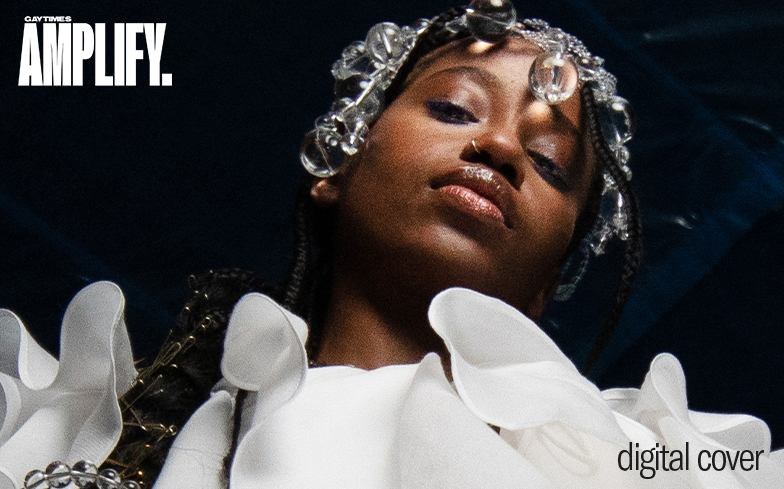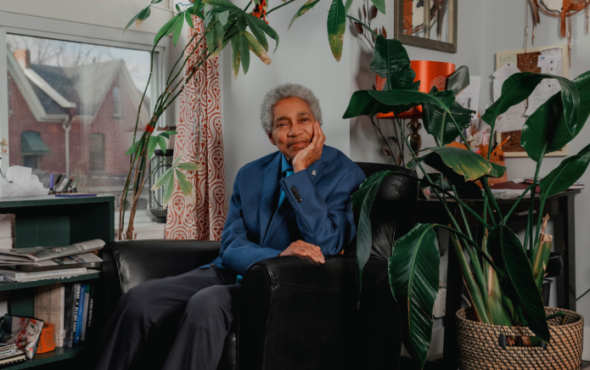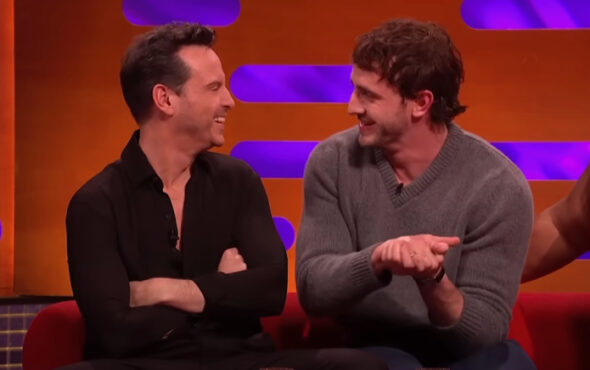
Dread is a feeling we’ve all become far too accustomed with over recent months.
If you weren’t already feeling it because of the political landscape, global warming and right-wing extremism, you’re probably feeling it now a pandemic has put the world in lockdown. So while many artists delay their albums in the hope for a more positive climate to celebrate their music, now feels like the perfect time for Denai Moore to release her third studio album Modern Dread.
“I wanted to contextualise what it means to be alive right now, which I think is very harrowing considering its drenched in a lot of anxiousness,” she says of the meaning behind her new record. “I named it Modern Dread because I recognised a universal feeling that I think we’re all experiencing in this generation, just this overwhelming dread about what’s happening in the world, and the effect it has on our mental health. I hope people can see themselves in some of the songs.”
Denai describes herself as a ‘genre-free’ artist, and it’s a descriptive she lives up to on the new record. From the soulful, lazy Sunday afternoon vibes of Cascades to the crashing marching band on lead single To The Brink and the more pop-leaning sounds of Slate, this is the sound of an artist simply doing what feels good to them – and it works. It’s reflective of a new age of music streaming, where artists don’t need to ascribe to a specific category or sound to find their place on the shelves in a record store.
“It’s almost impossible to reduce yourself to one genre, especially at such a unique time where we can listen to music from so many different time periods and be influenced by so much,” continues Denai. “I find it a bit reductive to be placed in boxes when a lot of the time it comes down to lazy analysis of musicians. I see it so much, especially with people of colour or women… It’s kind of crazy to me because I made this album with one of the biggest indie bands in the UK, and it’s weird that people will still call my record R&B. That doesn’t make sense to me.”
Ahead of the release of Modern Dread on 3 July, we spoke to Denai about the inspirations behind the new album, why collaborating with other queer creatives with a mutual understanding can lead to magic, and how she’s coping with the omnipresent sense of dread we’re all feeling during the coronavirus pandemic.
As soon as we saw the Modern Dread album cover, we knew we had to stan. Where did the inspiration for that artwork come from?
With that artwork, I knew that I needed to do something that was super iconic! Something very impactful and memorable because the whole concept of Modern Dread is so ‘of the time’ right now, and to me it’s a big album so I wanted to match that. So I had the idea of my braids floating and I found this really cool avant-garde black chair on Instagram and slowly started to piece things together. I had been visualising so many things for this album a year before I was even able to do it, so it was really nice to finish the cover and all of the visuals I had in my head, and bring it together and make it way better than what I originally had in mind.
How did the hair work? Was it Photoshop?
I actually used fishing wire and I basically tied two braids so it looked like they were floating, so in the original picture there’s only two braids floating but most of them were copied and made into that shape that’s on the cover.
Amazing. What would you say was the overall theme or goal with this record?
I wanted to contextualise what it means to be alive right now, which I think is very harrowing considering its drenched in a lot of anxiousness and… it’s not even guilt, but there’s this uncomfortable level of understanding of materialism and what’s important and what’s significant. So I started writing these songs and pieced it together that it should be called Modern Dread. The general theme of it to me makes sense that it should be heavy and immersive, so I took that into the production, and we really went for bold sounds and didn’t hide behind reverb or anything like that. Vocally, as well, I think it’s different from any record I’ve sung on before. The guy that produced the record, Alex [Robertshaw], he really pushed me to sing and to really challenge myself as to what I even thought I could sound like.

Is there a particular song on the album that has a special meaning to you?
There’s a few actually, but I am really proud of Hail. It’s about self-destruction, which is something that I personally struggle with. Being the voice of reason for myself can often be really hard. That song took me so long to finish, I started it years ago but it didn’t really make sense with the other records I’ve put out, and we revisited it in this really natural way and ended up with Hail as it is right now on the record. That’s probably my proudest moment, just because it took so long to finish and it felt really nice to… let it go, almost.
The video for Cascades is incredible. It’s always so great to see artists who really take the music video seriously as an art form. Is that something that’s always been important for you?
Yeah, I think visuals are so important and so impactful. My partner, she’s a director, and in the last two or three years or so I’ve been really heavily fixated on visuals and tying everything together and building a world that makes sense by itself outside of the music and what I’m singing about. I was really lucky to work on the Cascades video with an incredible director, Sam, and we really connected and he just got it. I made this brief where I wanted to create this inflatable, surreal world, I wanted to create something a bit weird, and he was really as enthusiastic as me. When it comes to weird costume or weird styling, it’s something I haven’t really explored in other music videos, so it was great to have fun with it.
You mentioned working with your partner – we speak to a lot of queer artists who say that there’s a special connection that makes magic when they work with other queer people. Has this been the case for you?
Yeah, totally, because there’s this person who sees me very authentically, more so than anyone else. She directed To The Brink which was the first single I put out from this record, and it’s amazing because she sees the process in its rawest form, a lot of the music before it’s finished. She also shot my album cover too, and I think it’s very important for me to be captured by people who see me very authentically. A really good friend shot my last album cover, and she captured me so well because she knows me so well. It’s always really important that whoever I work with can see that and tap into my world in a very authentic way, or there’s some kind of connection that makes sense.
Obviously this is a strange time to be releasing music, with the coronavirus pandemic affecting people around the world. How are you planning on making the most of what’s available during lockdown?
I mean, I feel totally insane promoting this album, but then again it feels really important given the title and a lot of the songs, the concept of Modern Dread feels so fitting for this time. Art is so important because of that, there’s this sense of identity that is captured by music and people feel understood and they can see themselves in music – and I feel that too, there are so many records getting me through the current situation. It’s the same with film. Art is so important for those reasons, because it connects everyone with these mutual feelings. So I don’t know, right now I’m trying to make music remotely, but mostly I’m trying to not put too much pressure on myself to create. But what I’ve been really loving at the moment is everyone’s live streams. There’s this really authentic sense of community and sharing, it’s a really human thing that I think is amazing to see happen.

You mentioned that music is helping get you through this, are there any particular albums or artists you’re revisiting right now?
Yeah, I listen to so many different kinds of music, but right now I’m really into Caribou’s new record. I’ve got a playlist that I put a lot of new tunes on, but his record at the moment is probably my favourite.
Given that your album is called Modern Dread, how do you cope with the feeling of dread, especially with everything going on right now?
I think my coping mechanism in reality is to make music and to create and be creative, it’s kind of the only thing that I find very cathartic, and it’s a way for me to address whatever I’m feeling. I also love reading so a big thing for me is to step away from social media and actually just read, and I find that helps me if I’m feeling anxious. I’m trying to use my phone a bit less and be more present in myself. Sometimes being a musician it feels like such a strange world, but it is the thing that keeps me sane at the same time. If I’m upset, I’ll pick up a guitar and write or just play chords to myself or sing. That’s my escapism.

You describe your music as genre-free – do you think genres and labels are becoming less relevant, especially with streaming making everything so accessible and experimental?
It’s totally irrelevant, I think, because it’s almost impossible to reduce yourself to one genre, especially at such a unique time where we can listen to music from so many different time periods and be influenced by so much. I find it a bit reductive to be placed in boxes when a lot of the time it comes down to lazy analysis of musicians. I see it so much, especially with people of colour or women. To call a woman a rock star and see them for what they are, and acknowledge production and these skills that people like Grimes have – there’s always this reluctance to see these people as what they deserve to be seen as. My friend Moses talks about it quite a lot, with being called an R&B artist. It’s kind of crazy to me because I made this album with one of the biggest indie bands in the UK, and it’s weird that people will still call my record R&B. That doesn’t make sense to me. But whenever I make a record or I’m in the studio, the only thing I try and do is express how I feel I sound like, and that can be so many different things – I play guitar, there’s a lot of trumpets on this record, there’s a lot of synths and modular things that I really geek out on. So I think that’s way more important for me than this talk of labels or genres.
Finally, when Modern Dread is finally out, what do you hope people can take away from it?
I hope people can feel something from it. I wrote this record and I named it Modern Dread because I recognised a universal feeling that I think we’re all experiencing in this generation, just this overwhelming dread about what’s happening in the world, and the effect it has on our mental health. I hope people can see themselves in some of the songs, but to be honest, I think I’m just excited for people to hear it. The biggest thing that’s out of my control is how people respond to the music – it is amazing when people enjoy the record and it may help them through a specific time in their lives, but I think just for people to hear it and have some reaction to it is a really amazing exchange. It’s insane in the sense that I start these songs on my own and I let them go, but art is about letting go and people reading in so many different ways. It’s amazing that this connection can be made with so many strangers around the world.
Denai Moore’s new album Modern Dread is released 3 July.

Photography Nadira Amrani
Words Daniel Megarry
Fashion Joel Palmer
Fashion Assistants Anairin Kaiones, Auryn Reeve and Gilliam Svenkov
Makeup Billie McKenzie
Makeup Assistant Clementine Beclier
Hair Rohmarra Kerr



